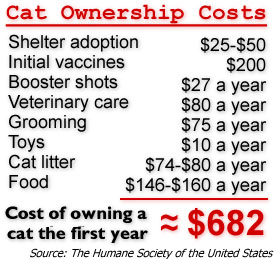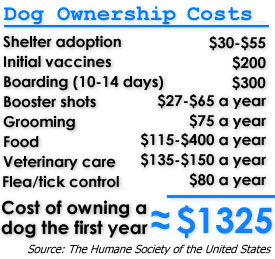|
Buying a new pet
|
 |
December 2, 1999: 7:39 a.m. ET
Take note of breed, living conditions when choosing a cat or dog
By Staff Writer Nicole Jacoby
|
NEW YORK (CNNfn) - Soft. Cuddly. Oozing with unconditional love.
Is there any heartache a pet can’t cure?
But before you run out and buy that puppy in the window, sit down, take a deep breath and think about what a new animal will really add to your life.
"A lot of people let their emotions get the best of them,” said Leslie Sinclair, director of veterinary issues for companion animals at the Humane Society of the United States. "...They just don’t think of the time or cost pet ownership can involve.”
Depending on the breed and history of the dog or cat you adopt, animals can be a lot of work -- and they can result in unexpected costs if you don’t know what you are getting yourself into.
Tens of thousands of animals end up in shelters each year after families adopt pets that don’t meet their expectations. To avoid any unpleasant surprises, think about how you see your new pet fitting in with your household.
"People need to envision what they see themselves doing with the dog or cat. Is this a cat that’s meant to keep Grandma company? Do you want a dog that can keep up with you when you go jogging? Or do you just want one that’s going to lie around on the couch?,” said Sinclair.
Mixed breed versus purebred
Buying a purebred animal will increase the likelihood you will get the characteristics you are looking for. Because certain breeds are associated with certain traits, their behavior can be easier to predict.
"With a purebred animal, you can really get a good sense of the size and temperament it will have later in life,” said Wayne Palmiter, a media services representative at the American Pet Association. In other words, if a small dog is what you want, a small dog is what you’ll get -- if you pick out a purebred Chihuahua, for instance.
But purebred animals are significantly more expensive than mixed breeds and there is no guarantee a purebred animal will make a better pet.
For one, because of inbreeding, purebred animals have a much higher chance of hereditary disease, which may result in heartbreak and costly medical bills down the line. A purebred animal may be more prone to hip dysphasia, progressive retinal atrophy and other costly and painful conditions.
Because of their value, a purebred is also more likely to be stolen or kept if found.

Mixed breed pets, on the other hand, can be adopted at animal shelters at a very low cost -- usually $25 to $55 -- and have a lower incidence of genetic defects.
A purebred may be your best option if you or someone else in your household suffers from certain allergies or if you need the dog to fit very specific criteria -- if it has to be child-friendly, for instance, or fit into a certain sized apartment. But if you are more flexible, a mixed breed may suit your needs just as well -- if not better.
"Mixed breeds are generally healthier and sometimes you get traits that you would not expect that can be fantastic,” said Palmiter. "The dog might turn out to be fantastic Frisbee dog or a great swimmer.”
Pet stores and puppy mills
Many consumers make the mistake of thinking an expensive animal or one bought from a pet store may have more inherent value than one adopted from a shelter.
But, often, the exact opposite proves to be true.
"The important thing for people to understand is that cost may not have anything to do with the health of the animal or its temperament,” said Sinclair.
Pet stores are generally considered the worst place to get an animal. That’s because a large number of pet retailers get their animals from so-called "puppy mills,” commercial breeding operations that mass-produce supposedly pedigreed dogs for sale in pet shops across the country.
Animals at these operations usually spend the majority of their lives in close quarters, locked in cages or kennels, with little individual attention. Consequently, these dogs are often more prone to behavioral disorders. In many cases, the lineage of these dogs is also questionable, with excessive inbreeding causing genetic problems.
"A lot of people just can’t make the connection between that puppy in the window and the horrible conditions they grew up in,” said Sinclair. "The puppy needs to be raised in conditions that he will live in for the rest of his life.”
While not all pet stores use puppy mills, it is almost impossible to separate legitimate retailers from less reputable ones, since shops rarely disclose where their animals come from.
Consequently, both the Humane Society and American Pet Association recommend against purchasing pets from retail outlets.
Shelter adoptions
Although some prospective pet owners may have some misgivings about adopting an animal from an animal shelter, these places are often the best source of strong, healthy pets.
"There is a misperception that these are second-hand animals not worthy of homes, but a lot of times these pets have been given up for reasons that have nothing to do with the animal,” Sinclair said.
More often than not, animals are brought to shelters because their owners did not put enough thought into what it might be like to own a pet or because housing requirements forced them to give up the animal.
One of the biggest advantages of getting a dog at a shelter is that its workers are qualified to help you match a dog or cat to your needs.
And contrary to popular belief, shelters are not limited to mutts. The vast majority of shelters have a good selection of purebreds on hand -- though their lineage may not be as sure a thing.
"That chocolate lab puppy might turn out to have white spots later, so you shouldn’t be shocked if a purebred turns out to be a mixed breed,” said Paltimer. "But at the same time it’s rare that we find someone unhappy with the animal.”
A rescue organization may be an alternative for prospective owners determined to get the genuine article. These groups focus on specific breeds, rescuing purebred animals that have been abandoned or brought to shelters.

Estimating costs
Pets are a lifetime financial commitment, so you should be prepared for new fiscal responsibilities even after the initial purchase or adoption.
"You need to be well prepared to spend about $200 to $400 dollars the first year and most of that the first few months,” said Sinclair. "After that, costs should taper off.”
Both puppies and kittens may require vaccines and booster shots, which run about $200 the first year. After the first year, vaccine costs drop significantly, about $27 to $65 for dogs and $27 for cats.
The cost of grooming supplies and services depend on the breed of your animal, how often the animal needs to be groomed and whether you can do it yourself or require a professional. Annual professional grooming runs about $75 a year for both cats and dogs.
If you travel regularly, you will have to take kennel costs into account, unless you have someone who is willing to take care of the animal for you while you are away. Typically, boarding an animal for about 10 to 14 days totals about $300.
Feeding costs will depend greatly on the size of your animal and whether it needs special supplements, but you can expect to spend about $115 to $400 annually on food for a dog and $140 to $160 a year for a cat.
Veterinary care can also add up. Standard diagnostic tests average about $135 to $150 a year for a dog and $80 a year for a cat. That’s assuming your pet has no other medical complications.
If you are a cat owner, kitty litter will cost you about $74 to $80 annually. And for dog owners, flea and tick control may cost about $80 a year. If a professional is required to treat your home for fleas, the cost can be considerably more.
Pets as gifts
With the holidays just around the corner, you may be thinking of giving a pet to friend or loved one.
But be careful of giving an animal to someone who has not expressly asked for one. For one, they might not be able to afford it.
"The money issue can really creep up on people,” said Palmiter. "If you buy a pet for someone else, you need to be sure they can handle the financial responsibility.”
You may also consider waiting until after the holidays to introduce a new pet into a home, even if it’s your own.
"Christmas is really not a good time to adopt a pet. The holidays are hectic with people moving in and out of the house. And there’s a lot of rich food around, which is not good for puppies,” said Sinclair.
Instead, Sinclair recommends people present the prospective pet owner with a gift certificate. These can be bought at animal shelters and cover basic adoption fees. That way recipients can have a bigger say in choosing the animal that will become their pet.
And in the meantime, you can supply leashes, books, and other toys, so that the area under the tree does not sit completely empty.
"There are so many wonderful things about adding a new member to the family. You can get all those fun things and have everything settled in time for the pet to arrive,” said Sinclair. 
|
|
|
Track your stocks
|
Note: Pages will open in a new browser window
External sites are not endorsed by CNNmoney
|
|
|
|
 |

|

